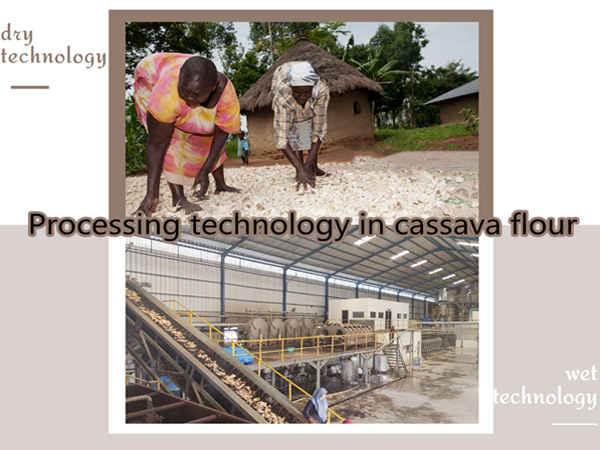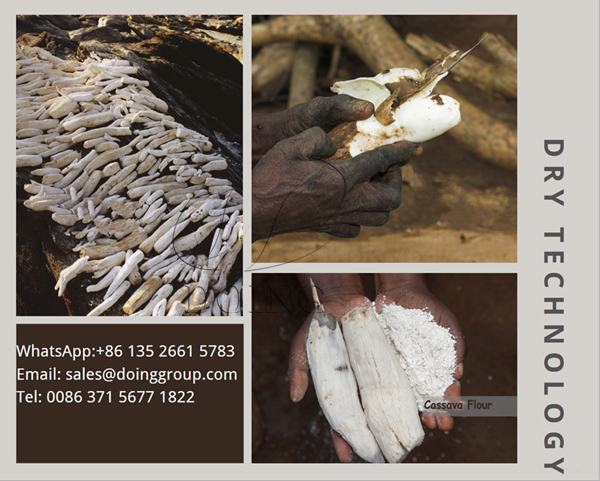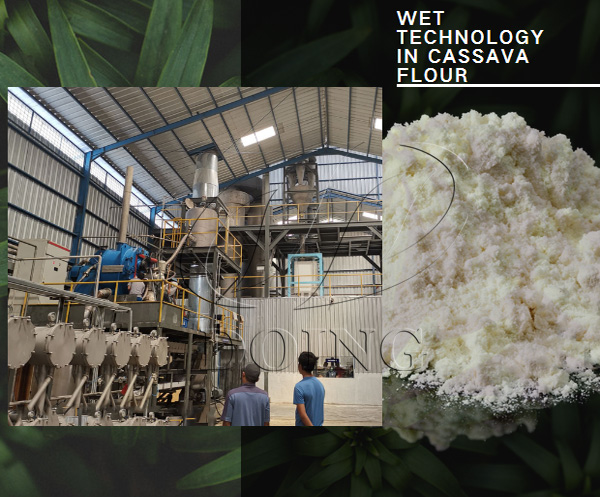 Tel/WhatsApp
Tel/WhatsApp
Processing technology in cassava flour: dry technology VS. wet technology
With time going by, there is a important shift from dry technology to wet technology in cassava flour processing. They are two types of processing technology and have many differences in many ways. So do you know how to choose suitable processing technology in you cassava flour processing business?You can learn some information by following article:
 Dry technology VS. Wet technology in cassava flour processing
Dry technology VS. Wet technology in cassava flour processing
The differences of the productive process:
Obviously, dry technology means there is no water during the cassava flour processing. It is a traditional technology in cassava flour processing. The main processing steps are: fresh cassava was cleaning in dry sieve, peeling by manual operation, then making pellets of chips, drying the cassava chips(or even drying the whole cassava tuber under the sun), finally milling the dry cassava into powder directly.
In contrast, wet technology needs fresh cassava is well cleaning and peeling, then milling into pulps directly. The DOING company adopts wet technology in cassava flour processing. Cassava pulp finally can be dewatered and dried in flash dryer machine. If you have a higher requirement for cassava flour fineness, you can match a sieving machine to separate the coarse powder. In this way can you get the high-quality cassava flour.
 Dry technology in cassava flour processing
Dry technology in cassava flour processing
The differences of the quality of final cassava flour:
The dry technology needs at least one day for the whole cassava flour processing. During the process, because of the lack of professional machinery, it is not easy to control the ash, sand, color, etc. However, wet technology needs less than 10mins in cassava flour processing and there is almost no oxidation during the processing which can ensure the whiteness of the cassava flour. That is also an important reason that we can get high-quality cassava flour by using wet technology.
The differences of their usages:
The cassava flour adopts dry technology that can be used for animal feed, industrial ethanol production, etc. While the high-quality cassava flour produced in wet technology has a higher requirement and is normally used in the food industry, like a biscuit, bread, etc, which can also be used for human consumption.
 DOING company adopts wet technology in cassava flour processing
DOING company adopts wet technology in cassava flour processing
Wet technology is mainstream processing technology in high quality cassava flour processing. Therefore, as an investor, if you want to processing high quality cassava flour, you should choose wet technology. DOING company adopts wet technology to process cassava flour which is high efficient and has high fineness. If you have any demands, please contact us.
-
 How to Choose a Reliable Bammy Making Plant? Key Factors List
How to Choose a Reliable Bammy Making Plant? Key Factors List
-
 How to Produce International Standard Cassava Starch?
How to Produce International Standard Cassava Starch?
-
 Move Beyond Local Cassava Pressing Machines with Henan Jinrui Reliable Equipment
Move Beyond Local Cassava Pressing Machines with Henan Jinrui Reliable Equipment
-
 Garri Processing vs. Cassava Starch Processing: Which is More Profitable and Easier to Start?
Garri Processing vs. Cassava Starch Processing: Which is More Profitable and Easier to Start?
-
 Investing in Cassava Starch Processing? Start with the Key Equipment for Success in Vietnam/Thailand Markets
Investing in Cassava Starch Processing? Start with the Key Equipment for Success in Vietnam/Thailand Markets
-
 The Potato Starch Processing Opportunity in 2025: Benefits and Challenges
The Potato Starch Processing Opportunity in 2025: Benefits and Challenges
-
 How to Choose Cassava Starch Processing Machine with Limited Capital to Cater for Both Farmers and Market?
How to Choose Cassava Starch Processing Machine with Limited Capital to Cater for Both Farmers and Market?
-
 Sustainable & Eco-Friendly Cassava Processing Solutions
Sustainable & Eco-Friendly Cassava Processing Solutions
-
 Solving 5 Common Challenges in Garri Processing with Modern Machinery
Solving 5 Common Challenges in Garri Processing with Modern Machinery
-
 Advantages of Cassava Starch Separating Machine - Centrifuge Sieve
Advantages of Cassava Starch Separating Machine - Centrifuge Sieve
-
 Henan Jinrui delivers attieke processing equipment to the customer in Côte d'Ivoire
Henan Jinrui delivers attieke processing equipment to the customer in Côte d'Ivoire
-
 Henan Jinrui Successfully Ships Cassava Flour Processing Line to Madagascar Client
Henan Jinrui Successfully Ships Cassava Flour Processing Line to Madagascar Client
-
 Henan Jinrui Advanced Cassava Starch Processing Equipment Wins Over Nigerian Food Processor
Henan Jinrui Advanced Cassava Starch Processing Equipment Wins Over Nigerian Food Processor
-
 Henan Jinrui Delivers Custom 1TPD Garri & Attieke Making Equipment to Benin
Henan Jinrui Delivers Custom 1TPD Garri & Attieke Making Equipment to Benin
-
 Henan Jinrui Secures Order from Benin for 1-Ton Daily Garri and Attieke Processing Machines
Henan Jinrui Secures Order from Benin for 1-Ton Daily Garri and Attieke Processing Machines
CONTACT US
DOING company offers cassava processing machine from single machine to the complete production line. If you want to get more details about cassava processing machine, please contact us:
- Do you want to buy machine?
- Yes, I want to buy machine
- No, I want to learn more in advance.
- What is your raw material?
- Cassava
- Potato
- Sweet potato
- Others
- 2. What is the final product you want to produce?
- Garri
- Cassava flour
- Cassava starch
- Cassava chips
- Attiekie
- Bammy
- Others
- 3.What is your capacity plan?
- Small scale garri machine
- 1ton per day
- 2tons per day
- 3tons per day
- 10tons per day
- 20tons per day
- Others
- 3.What is your capacity plan?
- Small scale
- 5tons per day
- 10tons per day
- 20tons per day
- 50tons per day
- 100tons per day
- Others
- 3.What is your capacity plan?
- Small scale
- 5tons per day
- 10tons per day
- 20tons per day
- 50tons per day
- 100tons per day
- 200tons per day
- 300tons per day
- Others
- 3.What is your capacity plan?
- Small scale
- Middle type
- Large scale
- What is your capacity plan?
- Small scale
- 5tons per day
- 10tons per day
- 20tons per day
- 50tons per day
- 100tons per day
- 200tons per day
- 300tons per day
- Others








